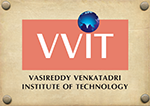Program Educational Objectives (PEOs)
The Programme Educational Objectives of the B.Tech in Electronics and Communications Engineering programme are given below and are numbered from PEO1 to PEO5.
|
PEO-1 |
To provide the graduates with solid foundation in Electronics and Communications Engineering along with the fundamentals of Mathematics, Science, Computing and Engineering with a view to impart in them high quality technical skills like designing, modeling, analyzing and problem-solving with global competence. |
|
PEO-2 |
To prepare and motivate graduates with recent technological developments related to core subjects like Advanced Signal Processing, VLSI, Embedded Systems, Wireless Communications and technological advances in the above mentioned domains so as to contribute effectively for Research and Development by participating in professional activities like publishing and seeking patents |
|
PEO-3 |
To train the graduates for a high degree of employability in both public and private sector industries at national and international level by initiating in them professional competence, ethical administrative acumen and ability to handle critical situations. |
|
PEO-4 |
To prepare the graduates for higher education by providing training to excel in competitive examinations and to improve their technical and intellectual capabilities for life-long learning process. |
|
PEO-5 |
To train the graduates to have basic interpersonal skills and sense of social responsibility that paves them a way to become good team members and leaders. |
Program Outcomes (POs)
The B.Tech ECE programme has documented measurable outcomes that are based on the needs of the programme’s stakeholders. The programme outcomes which are derived from ABET criteria are first drafted in the academic year 2009-10 and later revised in 2010-11. The programme outcomes that the department presently adapts to are as follows:
|
1 |
Engineering knowledge: |
apply the knowledge of mathematics, science, engineering fundamentals and an engineering specialization to the solution of complex engineering problems. |
|
2 |
Problem analysis: |
identify, formulate, review research literature, and analyze complex engineering problems reaching substantiated conclusions using first principles of mathematics, natural science and engineering sciences. |
|
3 |
Design/development of solutions: |
design solutions for complex engineering problems and design system components or processes that meet the specified needs with appropriate consideration for the public health and safety, and the cultural, societal and environmental considerations. |
|
4 |
Conduct investigations of complex problems: |
use research based knowledge and research methods including design of experiments, analysis and interpretation of data, and synthesis of the information to provide valid conclusions. |
|
5 |
Modern tool usage: |
create, select and apply appropriate techniques, resources and modern engineering and IT tools including prediction and modeling to complex engineering activities with an understanding of the limitations. |
|
6 |
The engineer and society: |
apply reasoning informed by the contextual knowledge to assess societal, health, safety, legal and cultural issues and the consequent responsibilities relevant to the professional engineering practice. |
|
7 |
Environment sustainability: |
understand the impact of the professional engineering solutions in the societal and environmental contexts, and demonstrate the knowledge of, and need for sustainable development. |
|
8 |
Ethics: |
apply ethical principles and commit to professional ethics and responsibilities and norms of the engineering practice. |
|
9 |
Individual and team work: |
function effectively as an individual and as a member or leader in diverse teams, and in multidisciplinary settings. |
|
10 |
Communication: |
communicate effectively on complex engineering activities with the engineering community and with society at large, such as, being able to comprehend and write effective reports and design documentation, make effective presentations, and give and receive clear instructions. |
|
11 |
Project management and finance: |
demonstrate knowledge and understanding of the engineering and management principles and apply these to one’s own work, as a member and leader in a team, to manage projects and in multidisciplinary environments. |
|
12 |
Lifelong learning |
recognize the need for, and have the preparation and ability to engage in independent and lifelong learning in the broader context of technological change. |
Program Specific Outcomes (PSOs)
|
PSO1 |
Interpretation Skills |
Students will acquire the skills necessary to design and validate electronic functional elements for a variety of applications along with the ability to interpret and communicate results |
|
PSO2 |
Core Competence |
Student will gain solid foundation in analysis, design and implementation of VLSI systems, communication systems, signal processing systems and embedded systems |


